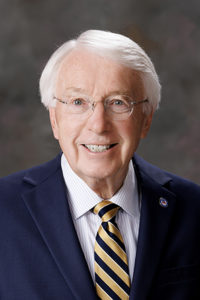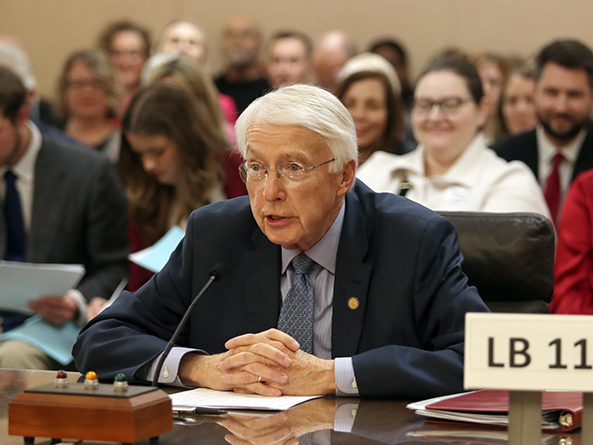Fetal anomaly abortion exception considered
The Judiciary Committee considered a bill Feb. 22 that would provide an exception to the 12-week abortion ban passed by the Legislature last year.

LB1109, introduced by Ralston Sen. Merv Riepe, would allow women to receive an abortion at up to 20 weeks of pregnancy if the fetus has a fatal fetal anomaly. The bill also would repeal criminal penalties for intentionally or recklessly performing an abortion in violation of state law, which currently is a Class IV offense.
The measure defines a fatal fetal anomaly as a terminal condition diagnosed before birth by at least two physicians that, in their reasonable medical judgment, is incompatible with life outside the womb and will result in the death of an unborn child upon birth or “inevitably thereafter.” Conditions such as Down syndrome or developmental disabilities would not be included in the definition, Riepe said.
During debate on additional abortion restrictions in 2023, Riepe said, he unsuccessfully offered an amendment with provisions similar to those in LB1109. Lawmakers ultimately approved a 12-week abortion ban based on gestational age without medical exceptions, he said, which he regrets.
“I failed last session to hold to my expectations, and we have an incomplete law,” Riepe said. “I feel compelled to right a wrong.”
Testifying in support of LB1109 was Tiffany Palmer, whose second pregnancy was determined not to be viable at around 20 weeks. Her baby was diagnosed with trisomy 18, she said, a condition with no treatment that results in death at birth or within the first year of life.
Growing up, Palmer said she thought of abortion as a “dirty word.” After her experience, however, it became clear to her that abortion is necessary in certain medical situations, she said.
“When thinking about abortion, please understand it’s not only for the unwed mothers who had a one-night stand,” Palmer said. “It’s a health care option for those who want a child, but nature gave them the short end of the stick.”
Speaking on behalf of Students for Life Action, Isabella Orsi testified against the proposal. The bill would enable more abortions, she said, and insinuates that children with genetic conditions are “fit only to be aborted.”
“LB1109 operates under the idea that a human being’s life should be ended because its span may be shorter than the average human lifespan,” Orsi said. “It would be unjust to allow Nebraskans to intentionally end the life of an innocent child still growing in their mother’s womb just because that child is deemed less than due to their physical condition.”
Robert Bonebrake, an OB-GYN in Omaha, also opposed the bill. Prenatal diagnoses are not always reliable, he said, citing instances of children diagnosed with fetal anomalies who have survived beyond expectancy.
“Unfortunately, there are times where we are wrong, even when consulting with multiple experts in the field,” Bonebrake said. “We cannot always know if the child will survive or not outside the uterus.”
Patricia Korensky of Lincoln, who lost a child due to a pregnancy complication, testified in opposition to LB1109. Although her doctor discussed the option of terminating the pregnancy when the complication was discovered, Korensky said, she opted to continue in order to spend as much time as possible with her unborn daughter. She said the pregnancy continued for another 10 weeks, which gave her and her family time to process what was happening and grieve.
“We had no way to know how long it would be, but we allowed nature to take the lead on her life and death,” Korensky said.
John Trapp, president of the Nebraska Medical Association, offered neutral testimony. The NMA supports the provision that would remove criminal penalties for doctors, he said, but the bill is too vague regarding which conditions would qualify as fatal fetal anomalies.
The committee took no immediate action on LB1109.


